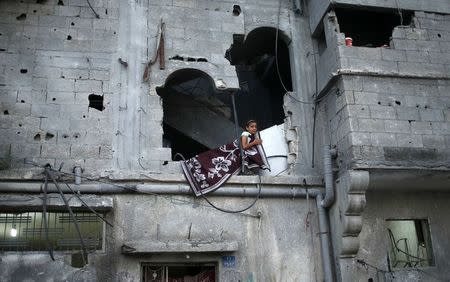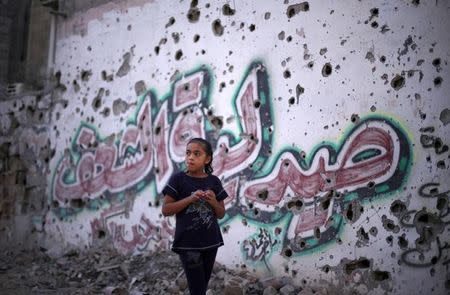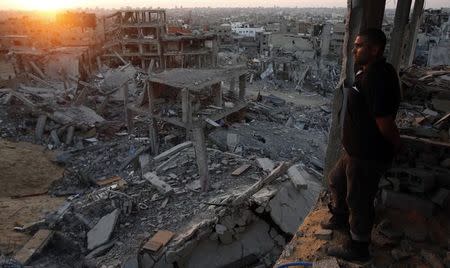Insight - Did Israel's 'Hannibal directive' lead to a war crime in Gaza?
By Maayan Lubell and Nidal al-Mughrabi KEREM SHALOM Israel/GAZA (Reuters) - The July-August war in Gaza drew international condemnation for a number of reasons, but one episode proved more deadly than any other: an Israeli air and artillery bombardment on Aug. 1 that killed 150 people in a matter of hours. Six weeks on from the war, with the toll of destruction still being counted, there is deepening unease about what took place that day, especially over whether too much force was used. Some legal experts say a war crime may have been committed. The events unfolded just as a three-day ceasefire was supposed to come into force. Hamas militants emerged from a tunnel inside Gaza and ambushed three Israeli soldiers, killing two of them and seizing the third. To rescue the soldier - dead or alive - and ensure Hamas could not use him as a hostage, the Israeli army invoked what is known as the "Hannibal directive", an order compelling units to do everything they can to recover an abducted comrade. What ensued was a furious assault on a confined area on the eastern edge of Rafah, the largest city in southern Gaza, home to around 200,000 people. Israeli artillery and tanks bombarded four neighbourhoods for several hours - at times firing a shell a minute - while fighter jets carried out air strikes. As well as the 150 people killed, medics in Gaza said around 200 were wounded, the majority civilians. It was the deadliest day of the seven-week conflict, in which more than 2,100 Palestinians, again most of them civilians, were killed, as well as 67 Israeli soldiers and six civilians in Israel. In the weeks since, civil rights campaigners, international legal experts and some Israeli military officers have raised concerns about the assault. One specific reservation is whether the abduction of a single soldier could have justified such heavy and relentless use of force in a populated area. A panel set up by the United Nations' Human Rights Commission is due to start investigating potential abuses in the war by both sides shortly, with Rafah one of several incidents investigators have indicated they will examine. Israel's Military Advocate General, the army's chief legal body, has opened its own probe into the events and has said it could launch a criminal investigation. International legal scholars have raised red flags over the justification. "If it is a legitimate military target then we've got to question if the damage and death done to civilians was proportionate," said Iain Scobbie, a professor of public international law at the University of Manchester. "In this case the answer is clearly no, it is not proportionate," he said, adding: "If it's not a legitimate military target, it's clearly a war crime because it is an unjustified use of force with effects on the civilian population." The Israeli military said the advocate-general's fact-finding teams were still working to establish precisely what happened and as a result it would not comment on specifics. But in a statement the Israel Defence Forces said: "There is no IDF directive or procedure which allows for a violation of international law, including the law of armed conflict." AUGUST 1 Mediators in Cairo had agreed with Israeli and Hamas representatives that a ceasefire would begin at 0800 local time. It is not clear what time Hamas attacked - Hamas at first said it was before the ceasefire started, Israel said it was after - but militants leapt out of the concealed tunnel to ambush the soldiers. Other Israeli soldiers from the same elite reconnaissance unit scrambled to the scene, where they found two bodies and realized that the third soldier, Second-Lieutenant Hadar Goldin, had been dragged back into the tunnel. The troops, all from the decorated Givati Brigade, got special permission to enter the potentially booby-trapped tunnel for an underground pursuit. They recovered some of Goldin's belongings, which allowed forensics experts to conclude later that he was killed in the ambush. Hamas has said it has the remains of Goldin and another Israeli soldier killed in the war. Colonel Ofer Winter, the Givati Brigade commander, said he was informed about the ambush at around 0900 and about half an hour later got word that a soldier was unaccounted for. "I declared over the radio the word that no one wants to utter - "Hannibal" - which means abduction," he told the Israeli newspaper Yedioth Ahronoth on Aug. 15. "I began to plan an assault towards Rafah. I instructed all forces to move forward, seize the area, so that the kidnappers would not be able to move." Intense artillery shelling, tank fire and air strikes followed, according to accounts from local reporters, residents and medics. At one point, the artillery fired at a rate of one shell a minute, with six cannons firing explosive and non-lethal smoke shells, according to a Reuters photographer. Abdel-Hakim Lafi, 57, had returned to his house in the area that morning in anticipation of the ceasefire. No sooner had he and his two sons got home than the bombardment began. "We ran out of the house and down a sandy road and as I was running shells were falling," he told Reuters. "One hit two women in front of me, I saw them, they were blown up, they were killed in front of my eyes." One of his sons, running just behind him, was also killed. "Everything west of the area where they said the soldier was taken was hit from the air and from the ground," said Hani Hammad, 28, a Palestinian journalist based in Rafah. In his comments to Yedioth Ahronoth, Colonel Winter defended the decision to use so much firepower. "Everything we did stemmed from the understanding that we could bring Hadar Goldin back alive," he said. "That is why we used all the force. Anyone who kidnaps has to know he will pay a price. It was not revenge, they just messed with the wrong brigade." FALLOUT In the days that followed, international attention focused on getting a durable ceasefire in place. But questions soon started to be raised about the Rafah bombardment. The Association for Civil Rights in Israel called for an investigation into why the Hannibal directive was employed in a populated, urban area, saying it "fundamentally violated the principle of distinction in international law". In an interview with Reuters, Brigadier-General Roy Riftin, the head of the IDF artillery, drew a distinction between Rafah and two other incidents in which heavy artillery was used. "When a force is in jeopardy or under severe threat, we carry out rescue fire," he explained, adding that in the other two cases, residents had been warned to leave the area prior to troops moving in and before artillery was used. "The Hannibal protocol declared for Hadar Goldin is completely different," he said. "It should be examined at completely different levels." It remains unclear how high up the chain of command the declaration of the directive went. Yet regardless of who gave the green light, one central question remains: was it proportionate? Marco Sassoli, a professor at the University of Geneva and a leading authority on international law, said it appeared not to be. "They may not simply bomb a whole area if they don't know where the person is, just to make sure that the soldier cannot be evacuated," he said. "It is an advantage not to lose one soldier but it is not such a great advantage that it would justify risking to kill hundreds of civilians." Other experts underscored the importance of recovering a soldier, while saying that did not justify carte blanche. "It's more than just a simple mathematical calculation," said Michael Schmitt, a professor of international law at the U.S. Naval War College's Stockton Center, who would comment on the principles involved but not the specific Rafah case. "All militaries rate the protection of their forces as very high and for very good reason. You want morale among the troops, you want troops to know you will come to their assistance if they get in a tight spot and so forth," Schmitt said. "Although if someone has been captured this does not mean you can completely take off the gloves," he added. INTERNATIONAL CRIMINAL COURT Part of Israel's rationale for responding so intensely in such cases is that it has paid heavily for captured soldiers in the past. In 2006, Gilad Shalit was seized near Gaza and spent five years in Hamas captivity. He was released in exchange for more than 1,000 Palestinian prisoners. The Hannibal directive was drafted in 1986 after three soldiers from the Givati Brigade were captured in Lebanon. Their comrades saw the vehicle getting away and did not open fire. The directive aims to ensure that does not happen again. Critics say it is misinterpreted on the ground as implying that it is better to have a dead soldier than a captured one. The military has declined to define it precisely in public, only emphasising the need to prevent a soldier being taken. The debate has at times prompted army chiefs to stress that while risking the captive's life was allowed, targeting him was not. Israel, having fought many wars since its founding in 1948, has been accused of war crimes many times, and has levelled similar accusations against its enemies, including Hamas. What could be different now is that the Palestinians are on the brink of joining the International Criminal Court, a move that would allow them to take action against Israel, but could also open the door to criminal proceedings against Hamas. The head of the U.N. Human Rights Commission panel investigating the Gaza war has said any evidence it gathers could be used by the ICC in a war crimes case against Israel. The panel's final report is due by March next year. The next few months - including whether Israel decides to cooperate with the investigation - will prove critical in determining if war crimes charges are eventually levelled. (Additional reporting by Dan Williams and Baz Ratner; Writing by Maayan Lubell; Editing by Luke Baker and Anna Willard)





